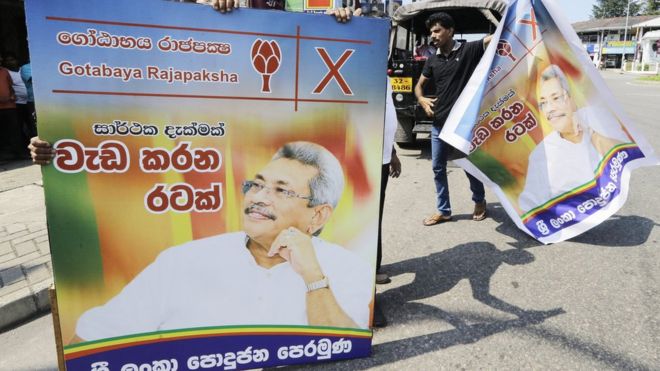On Saturday, November 16, Sri Lanka held its presidential election, the third since the
end of its Civil War in 2009. This election centers around some of the most contentious issues in
Sri Lanka today, most importantly security and minority rights. Ethnic tensions and the aftermath
of this year’s Easter Sunday bombings weigh heavily on voters and are likely to be the deciding
factors in the election. The race, which currently features over 30 candidates, is expected to be
closely contested and is certain to be controversial regardless of result.
The heart of the controversy centers around the Rajapaksa family. Brothers Gotabaya and
Mahinda are credited with helping to end the 26-year Civil War with the Tamil Tigers, a Tamil
separatist group in the Northeast of the country (Bastians & Schultz: 2019). While the resolution
of their campaign against the Tigers certainly strengthened their credibility on security, the
means by which they achieved success and the subsequent behavior has been criticized by many.
Gotabaya Rajapaksa, who is one of the frontrunners for the election, was the Defense Chief
under his brother at the end of the war. During that time, he is accused of bombing civilian
hospitals, orchestrating the disappearance of thousands of people, mostly Tamil, and being
involved with the torture and killing of a journalist (Bastians & Schultz: 2019).
While many Tamil people are deeply distrusting of Rajapaksa, other, particularly
members of the Sinhalese-Hindu majority, have turned to him for the promise of security
(Limaye: 2019). It is easy to understand the appeal considering the trauma the country recently
experienced. The Easter Sunday attacks, which were perpetrated by Islamic militants and killed
269, made security a top priority in this election. Incumbent Maithripala Sirisena’s decision not
to run in this election is partially attributed to his perceived mishandling of intelligence prior to
the attacks (Limaye: 2019). Rajapaksa’s campaign has centered around a projection of strength,
both in security and the economy, and the prospect of a tough-on-terror president who promises
economic restoration resonates with many in Sri Lanka.
Rajapaksa’s main opposition is Sajith Premadasa, son of a former president who was
assassinated during the Civil War. Despite his lineage, Premadasa has generated grassroots
support among, especially among poor, and minority districts (Bastians & Schultz: 2019). While
Premadasa has made promises to tighten security throughout the country, his campaign is
primarily rooted in social issues like poverty and housing (Limaye: 2019). Members of minority
groups also favor Premadasa as the most viable opposition to Rajapaksa, who the see as
potentially dangerous to them.
There are several factors in this election which may be concerning for the state of
democracy in Sri Lanka, largely centered around Rajapaksa. First is his popularity despite the
accusations made against him. While the specific allegations are difficult to verify, the number of
cases in which he is accused of violating civil liberties or human rights is concerning. That the
people of Sri Lanka are willing to support Rajapaksa despite his accused violation of these rights
is even more concerning. It is problematic when a leader uses his power to suppress opposition
to his power due to violations of civil and human rights; it is perhaps more concerning when he
doesn’t have to, because the people are willing to support him despite accused violations. This
behavior is not necessarily surprising in light of recent events. When people feel threatened, they
are generally willing to sacrifice some liberties in order to guarantee their safety, so it is
understandable that the people of Sri Lanka may be able to tolerate Rajapaksa’s troubled past if
they see him as the candidate most able to secure their safety. Nonetheless, such a tradeoff is
dangerous for the long-term health of democracy.
Additionally, there are concerns about the treatment of minorities throughout the election
process. Supporters of Rajapaksa have stoked anti-Muslim sentiments to expand his base in areas
with Hindu-Tamils populations fearful of Islamic militancy (Bastians & Schultz: 2019).
Additionally, a group of Muslim voters was attacked on their way to vote on Saturday (Schmall
& Francis: 2019). While political violence of this type was not widespread throughout the
country, any attempt to discourage a group from voting through violence and intimidation is
dangerous. Equally concerning are comments made by an ally of Rajapaksa, who explicitly
described a need to undermine and suppress Muslim vote in the election (Bastians & Schultz:
2019).
As I am writing now, votes are in the process of being counted. All indications suggest a
close, competitive race between Rajapaksa and Premadasa. Regardless of who wins, the result
will dictate much for the future of Sri Lanka. A Rajapaksa presidency does not by any means
guarantee a further backslide into authoritarianism, but nonetheless raises apprehensions for
minority rights and rule of law.
Update:
With the results finalized, Gotabaya Rajapaksa won the election with 52% of the vote
(Lonsdorf: 2019). This result affirms Sri Lanka’s prioritization of security and willingness to
sacrifice some democratic liberties to secure it.
Works Cited
Bastians, Dharisha and Schultz, Kai. “In Sri Lanka’s Presidential Election, a Question of Security vs. Rights.” November 16, 2019. The New York Times. https://www.nytimes.com/2019/11/16/world/asia/sri-lanka-election-rajapaksa.html
Lonsdorf, Kat. “Gotabaya Rajapaksa Wins Sri Lankan Presidential Elections.” November 17, 2019. NPR. https://www.npr.org/2019/11/17/780241242/gotabaya-rajapaksa-wins-srilankan-presidential-elections
Limaye Yogita. “Sri Lanka Votes for President in Shadow of Easter Sunday Attack.” November 16, 2019. BBC. https://www.bbc.com/news/world-asia-50013478
Schmall, Emily and Francis, Krishan. “Muslim Voters Attacked in Sri Lanka Presidential Election.” November 16, 2019. The Associated Press. https://apnews.com/211da2270d354bf89db567a804ce6d17

